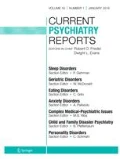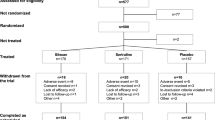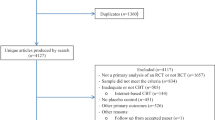Abstract
There have been significant advancements in the pharmacologic management of posttraumatic stress disorder (PTSD) in the past two decades. Multisite randomized clinical trials (RCTs) have noted the efficacy of selective serotonin reuptake inhibitors (SSRIs) and serotonin-norepinephrine reuptake inhibitors (SNR Is) for PTSD treatment. Unfortunately, there have been no new medications approved to treat PTSD in the past 10 years. Although there have been exciting new findings in our knowledge of the neurobiology of PTSD, clinical trials testing new medications have lagged. This review summarizes recent research that builds on the unique pathophysiology of PTSD and suggests ways to move the field forward.
Similar content being viewed by others
References
Papers of particular interest, published recently, have been highlighted as: • Of importance •• Of major importance
Friedman MJ, Davidson JRT, Stein DJ. Psychopharmacotherapy for adults. In: Foa EB et al., editors. Effective treatments for PTSD: practice guidelines from the international society for traumatic stress studies. 2nd ed. New York: Guilford Press; 2009. p. 245–68.
Forbes D et al. A guide to guidelines for the treatment of PTSD and related conditions. J Trauma Stress. 2010;23(5):537–52.
Department of Veterans Affairs. Post Traumatic Stress Disorder: VA/DoD Clinical Practice Guideline. 2010 October 2010 [cited 2014 4/17/2014]; Available from: http://www.healthquality.va.gov/Post_Traumatic_Stress_Disorder_PTSD.asp.
Connor KM et al. Fluoxetine in post-traumatic stress disorder. Randomised, double-blind study. Br J Psychiatry J Ment Sci. 1999;175:17–22.
Brady K et al. Efficacy and safety of sertraline treatment of posttraumatic stress disorder: a randomized controlled trial. J Am Med Assoc. 2000;283(14):1837–44.
Davidson JRT et al. Efficacy of sertraline in preventing relapse of posttraumatic stress disorder: results of a 28-week double-blind, placebo-controlled study. Am J Psychiatr. 2001;158(12):1974–81.
Marshall RD et al. Efficacy and safety of paroxetine treatment for chronic PTSD: a fixed-dose, placebo-controlled study. Am J Psychiatr. 2001;158(12):1982–8.
Tucker P et al. Paroxetine in the treatment of chronic posttraumatic stress disorder: results of a placebo-controlled, flexible-dosage trial. J Clin Psychiatry. 2001;62(11):860–8.
Davidson JRT et al. Venlafaxine extended release in posttraumatic stress disorder: a sertraline- and placebo-controlled study. J Clin Psychopharmacol. 2006;26(3):259–67.
Davidson JRT et al. Treatment of posttraumatic stress disorder with venlafaxine extended release: a 6-month randomized controlled trial. Arch Gen Psychiatry. 2006;63(10):1158–65.
IOM. Treatment of posttraumatic stress disorder: an assessment of the evidence. Washington, DC: The National Academies Press; 2008.
Tol WA, Barbui C, van Ommeren M. Management of acute stress, PTSD, and bereavement: WHO recommendations. JAMA J Am Med Assoc. 2013;310(5):477–8.
World Health Organization Division of Mental Health. Guidelines for the Management of Conditions Specifically Related to Stress. 2013; Available from: http://www.who.int/mental_health/resources/emergencies.
Jonas DE et al. Psychological and pharmacological treatments for adults with posttraumatic stress disorder (PTSD). 2013.
Naylor JC et al. A pilot randomized controlled trial with paroxetine for subthreshold PTSD in Operation Enduring Freedom/Operation Iraqi Freedom era veterans. Psychiatry Res. 2013;206(2–3):318–20.
Brady KT et al. Sertraline in the treatment of co-occurring alcohol dependence and posttraumatic stress disorder. Alcohol Clin Exp Res. 2005;29(3):395–401.
Zohar J et al. Double-blind placebo-controlled pilot study of sertraline in military veterans with posttraumatic stress disorder. J Clin Psychopharmacol. 2002;22(2):190–5.
Tucker P, Potter-Kimball R, Wyatt DB, Parker DE, Burgin C, Jones DE, et al. Can physiologic assessment and side effects tease out differences in PTSD trials? A double-blind comparison of citalopram, sertraline, and placebo. Psychopharmacol Bull. 2003;37(3):135–49.
Friedman MJ et al. Randomized, double-blind comparison of sertraline and placebo for posttraumatic stress disorder in a Department of Veterans Affairs setting. J Clin Psychiatry. 2007;68(5):711–20.
Martenyi F, Brown EB, Caldwell CD. Failed efficacy of fluoxetine in the treatment of posttraumatic stress disorder: results of a fixed-dose, placebo-controlled study. J Clin Psychopharmacol. 2007;27(2):166–70.
Shalev AY et al. Prevention of posttraumatic stress disorder by early treatment: results from the Jerusalem Trauma Outreach and Prevention study. Arch Gen Psychiatry. 2012;69(2):166–76.
Gerger H, Munder T, Barth J. Specific and nonspecific psychological interventions for PTSD symptoms: a meta-analysis with problem complexity as a moderator. J Clin Psychol. 2014;70(7):601–15.
Martényi F et al. Fluoxetine v. placebo in prevention of relapse in post-traumatic stress disorder. Br J Psychiatry. 2002;181(4):315–20.
Wetherell JL et al. Age differences in treatment response to a collaborative care intervention for anxiety disorders. Br J Psychiatry J Ment Sci. 2013;203(1):65–72.
Watts BV et al. Meta-analysis of the efficacy of treatments for posttraumatic stress disorder. J Clin Psychiatry. 2013;74(6):e541–50.
Friedman MJ, et al. Effects of sertraline and placebo in men with posttraumatic stress disorder (PTSD). In Annual Meeting of the American Psychiatric Association. Chicago, IL; 2000.
Friedman MJ. Pharmacotherapy for PTSD: a status report. National Center for PTSD Clinical Quarterly. 1997;7(4):75–7.
Schnurr PP et al. Cognitive behavioral therapy for posttraumatic stress disorder in women: a randomized controlled trial. JAMA J Am Med Assoc. 2007;297(8):820–30.
Laffaye C et al. Does compensation status influence treatment participation and course of recovery from post-traumatic stress disorder? Mil Med. 2007;172(10):1039–45.
Marx BP, Pollack S. A false dilemma and an unfair characterization of veterans. Psychiatr Serv. 2013;64(4):392.
Friedman ES et al. Baseline depression severity as a predictor of single and combination antidepressant treatment outcome: results from the CO-MED trial. Eur Neuropsychopharmacol J Eur Coll Neuropsychopharmacol. 2012;22(3):183–99. These data help inform us on the impact of baseline depressive severity in response to antidepressant medication effectiveness.
Sher L, Braquehais MD, Casas M. Posttraumatic stress disorder, depression, and suicide in veterans. Cleve Clin J Med. 2012;79(2):92–7.
Nanni V, Uher R, Danese A. Childhood maltreatment predicts unfavorable course of illness and treatment outcome in depression: a meta-analysis. Am J Psychiatry. 2012;169(2):141–51.
Miniati M et al. Clinical characteristics and treatment outcome of depression in patients with and without a history of emotional and physical abuse. J Psychiatr Res. 2010;44(5):302–9.
Laddis A. Medication for complex posttraumatic disorders. J Aggress Maltreat Trauma. 2011;20(6):645–68.
Londborg PD et al. Sertraline treatment of posttraumatic stress disorder: results of 24 weeks of open-label continuation treatment. J Clin Psychiatry. 2001;62(5):325–31.
Rapaport MH, Endicott J, Clary CM. Posttraumatic stress disorder and quality of life: results across 64 weeks of sertraline treatment. J Clin Psychiatry. 2002;63(1):59–65.
Marshall RD et al. A controlled trial of paroxetine for chronic PTSD, dissociation, and interpersonal problems in mostly minority adults. Depress Anxiety. 2007;24(2):77–84.
Rothbaum BO et al. Augmentation of sertraline with prolonged exposure in the treatment of posttraumatic stress disorder. J Trauma Stress. 2006;19(5):625–38.
Davidson J, Stein DJ, Rothbaum BO, Pedersen R, Szumski A, Baldwin DS. Resilience as a predictor of treatment response in patients with posttraumatic stress disorder treated with venlafaxine extended release or placebo. J Psychopharmacol. 2012;26(6):778–83.
Camardese G et al. P. 2. a. 026 Predicting treatment outcome in difficult-to-treat depressed patients. Eur Neuropsychopharmacol. 2007;17:S326–7.
Stein DJ et al. Onset of activity and time to response on individual CAPS-SX17 items in patients treated for post-traumatic stress disorder with venlafaxine ER: a pooled analysis. Int J Neuropsychopharmacol Off Scientific Journal of the Collegium Internationale Neuropsychopharmacologicum. 2009;12(1):23–31.
Shin HJ et al. Longitudinal correlates of aggressive behavior in help-seeking U.S. veterans with PTSD. J Trauma Stress. 2012;25(6):649–56.
Bernardy NC et al. Prescribing trends in veterans with posttraumatic stress disorder. J Clin Psychiatry. 2012;73(3):297–303.
Simon NM et al. Paroxetine CR augmentation for posttraumatic stress disorder refractory to prolonged exposure therapy. J Clin Psychiatry. 2008;69(3):400–5.
Schneier FR et al. Combined prolonged exposure therapy and paroxetine for PTSD related to the World Trade Center attack: a randomized controlled trial. Am J Psychiatry. 2012;169(1):80–8.
Hofmann SG et al. D-cycloserine augmentation of cognitive behavioral therapy for anxiety disorders: an update. Curr Psychiatry Rep. 2015;17(1):532.
Litz BT et al. A randomized placebo-controlled trial of D-cycloserine and exposure therapy for posttraumatic stress disorder. J Psychiatr Res. 2012;46(9):1184–90.
Rothbaum BO et al. A randomized, double-blind evaluation of D-cycloserine or alprazolam combined with virtual reality exposure therapy for posttraumatic stress disorder in Iraq and Afghanistan War veterans. Am J Psychiatry. 2014;171(6):640–8.
de Kleine RA et al. A randomized placebo-controlled trial of D-cycloserine to enhance exposure therapy for posttraumatic stress disorder. Biol Psychiatry. 2012;71(11):962–8.
Difede J et al. D-Cycloserine augmentation of exposure therapy for post-traumatic stress disorder: a pilot randomized clinical trial. Neuropsychopharmacol Off Publ Am Coll Neuropsychopharmacol. 2013;39(5):1052–8.
Yehuda R, et al. Cortisol augmentation of a psychological treatment for warfighters with posttraumatic stress disorder: Randomized trial showing improved treatment retention and outcome. Psychoneuroendocrinology, 2014. In this recent pilot trial, patients who received hydrocortisone during a course of PE were less likely to drop out of treatment compared to those on placebo.
Bartzokis G et al. Adjunctive risperidone in the treatment of chronic combat-related posttraumatic stress disorder. Biol Psychiatry. 2005;57(5):474–9.
Hamner MB et al. Adjunctive risperidone treatment in post-traumatic stress disorder: a preliminary controlled trial of effects on comorbid psychotic symptoms. Int Clin Psychopharmacol. 2003;18(1):1–8.
Monnelly EP et al. Low-dose risperidone as adjunctive therapy for irritable aggression in posttraumatic stress disorder. J Clin Psychopharmacol. 2003;23(2):193–6.
Reich DB et al. A preliminary study of risperidone in the treatment of posttraumatic stress disorder related to childhood abuse in women. J Clin Psychiatry. 2004;65(12):1601–6.
Bernardy NC, Friedman MJ. A practical guide to PTSD treatment: Pharmacological and psychotherapeutic approaches. 2015.
Rothbaum BO et al. Placebo-controlled trial of risperidone augmentation for selective serotonin reuptake inhibitor-resistant civilian posttraumatic stress disorder. J Clin Psychiatry. 2008;69(4):520–5.
Hermes ED, Sernyak M, Rosenheck R. Use of second-generation antipsychotic agents for sleep and sedation: a provider survey. Sleep. 2013;36(4):597–600.
Krystal JH et al. Adjunctive risperidone treatment for antidepressant-resistant symptoms of chronic military service-related PTSD: a randomized trial. JAMA J Am Med Assoc. 2011;306(5):493–502.
Jain S, Greenbaum MA, Rosen CS. Do veterans with posttraumatic stress disorder receive first-line pharmacotherapy? Results from the longitudinal Veterans health survey. The primary care companion to CNS disorders, 2012. 14(2).
Raskind MA et al. A parallel group placebo controlled study of prazosin for trauma nightmares and sleep disturbances in combat veterans with post-traumatic stress disorder. Biol Psychiatry. 2007;61(8):928–34.
Raskind MA et al. Reduction of nightmares and other PTSD symptoms in combat veterans by prazosin: a placebo-controlled study. Am J Psychiatr. 2003;160(2):371–3.
Byers MG et al. Prazosin versus quetiapine for nighttime posttraumatic stress disorder symptoms in veterans: an assessment of long-term comparative effectiveness and safety. J Clin Psychopharmacol. 2010;30(3):225–9.
Raskind MA, et al. A trial of prazosin for combat trauma PTSD with nightmares in active-duty soldiers returned from Iraq and Afghanistan. Am Jf psychiatry, 2013.
Pollack MH et al. Eszopiclone for the treatment of posttraumatic stress disorder and associated insomnia: a randomized, double-blind, placebo-controlled trial. J Clin Psychiatry. 2011;72(7):892–7.
Manteghi AA et al. Baclofen add-on to citalopram in treatment of posttraumatic stress disorder. J Clin Psychopharmacol. 2014;34(2):240–3.
Drake RD et al. Baclofen treatment for chronic posttraumatic stress disorder. Ann Pharmacother. 2003;37(9):1177–81.
Friedman M, Davidson J. Pharmacotherapy for PTSD. In: Friedman M, Keane TM, Resick PA, editors. Handbook of PTSD: science and practice. New York: Guilford Publications; 2014. p. 482–501.
Kessler RC et al. Posttraumatic stress disorder in the National Comorbidity Survey. Arch Gen Psychiatry. 1995;52(12):1048–60.
Saxon AJ, Simpson TL. Co-occurring substance use disorders and PTSD. In: Bernardy NC, Friedman M, editors. A practical guide to PTSD treatment. Washington DC: American Psychological Association; 2015. p. 135–50.
Batki SL et al. Topiramate treatment of alcohol use disorder in veterans with posttraumatic stress disorder: a randomized controlled pilot trial. Alcohol Clin Exp Res. 2014;38(8):2169–77.
Akuchekian S, Amanat S. The comparison of topiramate and placebo in the treatment of posttraumatic stress disorder: a randomized, double-blind study. J Res Med Sci. 2004;9(5):240–4.
Petrakis IL et al. Naltrexone and disulfiram in patients with alcohol dependence and comorbid post-traumatic stress disorder. Biol Psychiatry. 2006;60(7):777–83.
Foa EB et al. Concurrent naltrexone and prolonged exposure therapy for patients with comorbid alcohol dependence and PTSD: a randomized clinical trial. JAMA J Am Med Assoc. 2013;310(5):488–95.
Simpson TL et al. A pilot trial of the alpha-1 adrenergic antagonist, prazosin, for alcohol dependence. Alcohol Clin Exp Res. 2009;33(2):255–63.
Fox HC et al. Prazosin effects on stress- and cue-induced craving and stress response in alcohol-dependent individuals: preliminary findings. Alcohol Clin Exp Res. 2012;36(2):351–60.
Pettinati HM et al. A double-blind, placebo-controlled trial combining sertraline and naltrexone for treating co-occurring depression and alcohol dependence. Am J Psychiatry. 2010;167(6):668–75.
Petrakis IL et al. Noradrenergic vs serotonergic antidepressant with or without naltrexone for veterans with PTSD and comorbid alcohol dependence. Neuropsychopharmacol Off Publ Am Coll Neuropsychopharmacol. 2012;37(4):996–1004.
Fox HC et al. Guanfacine effects on stress, drug craving and prefrontal activation in cocaine dependent individuals: preliminary findings. J Psychopharmacol. 2012;26(7):958–72. This paper presents preliminary findings on the use of guanfacine’s potential to reduce stress-induced and cue-induced drug craving and arousal.
Hamblen JL, Kivlahan D. Posttraumatic stress disorder and substance use in veterans in Trauma Psychology Newsletter2013. Am Psychol Assoc.
McFall M et al. Integrating tobacco cessation into mental health care for posttraumatic stress disorder: a randomized controlled trial. JAMA J Am Med Assoc. 2010;304(22):2485–93.
Zatzick D et al. A randomized stepped care intervention trial targeting posttraumatic stress disorder for surgically hospitalized injury survivors. Ann Surg. 2013;257(3):390–9. This effectiveness trial randomized acutely injured trauma survivors to a stepped combined care management, pharmacotherapy and cognitive behavioral psychotherapy intervention that demonstrated over the course of a year that the intervention significantly reduced PTSD symptoms compared to controls in usual care.
Walter KH et al. The impact of personality disorders on treatment outcome for veterans in a posttraumatic stress disorder residential treatment program. Cogn Ther Res. 2012;36(5):576–84.
Duax JM et al. Prolonged exposure therapy for a Vietnam veteran with PTSD and early-stage dementia. Cogn Behav Pract. 2013;20(1):64–73.
Nijdam MJ, et al. Treatment of sexual trauma dissolves contamination fear: case report. Eur J Psychotraumatology. 2013;4.
Grubaugh AL et al. Perceptions of PTSD research participation among patients with severe mental illness. Psychiatry Res. 2012;200(2–3):1071–3.
Poundja J, et al. Trauma reactivation under the influence of propranolol: an examination of clinical predictors. Eur J Psychotraumatology. 2012;3.
Dunlop BW, Mansson E, Gerardi M. Pharmacological innovations for posttraumatic stress disorder and medication- enhanced psychotherapy. Curr Pharm Des. 2012;18(35):5645–58. This review highlighted new arenas for potential medication treatments for PTSD.
Feder A et al. Efficacy of intravenous ketamine for treatment of chronic posttraumatic stress disorder: a randomized clinical trial. JAMA Psychiatry. 2014;71(6):681–8. This randomized, double-blind, crossover trial provides the first evidence for rapid reduction in PTSD symptom severity following ketamine infusine.
Neumeister A. The endocannabinoid system provides an avenue for evidence-based treatment development for PTSD. Depress Anxiety. 2013;30(2):93–6. The data reported in this paper provide a critical foundation upon which to develop biomarkers of PTSD vulnerability as well as new pharmacotherapies.
Kohler O, et al. Effect of anti-inflammatory treatment on depression, depressive symptoms, and adverse effects: a systematic review and meta-analysis of randomized clinical trials. JAMA Psychiatry. 2014.
Rasmusson AM, Shalev AY. Integrating the neuroendocrinology, neurochemistry, and neuroimmunology of PTSD to date and the challenges ahead. In: Friedman MJ, Keane TM, Resick PA, editors. Handbook of PTSD science and practice. New York: The Guilford Press; 2014. p. 275–99.
Lader MH. Benzodiazepines revisited—will we ever learn? Addiction. 2011;106(12):2086–109.
Bernardy NC et al. Gender differences in prescribing among veterans diagnosed with posttraumatic stress disorder. J Gen Intern Med. 2013;28 Suppl 2:S542–8.
Abramowitz EG et al. Hypnotherapy in the treatment of chronic combat-related PTSD patients suffering from insomnia: a randomized, zolpidem-controlled clinical trial. Int J Clin Exp Hypn. 2008;56(3):270–80.
Gunja N. In the Zzz zone: the effects of z-drugs on human performance and driving. J Med Toxicol Off J Am Coll Med Toxicol. 2013;9(2):163–71.
Association AP. DSM 52013: American Psychiatric Association.
Acknowledgments
This material is the result of work supported with resources and the use of facilities at the Executive Division of the National Center for PTSD at the White River Junction, Vermont VA Medical Center. Appreciation is expressed to Ms. Aaron Jenkyn for assistance with preparation of this manuscript.
Compliance with Ethics Guidelines
ᅟ
Conflict of Interest
Nancy C. Bernardy and Matthew J. Friedman declare that they have no conflict of interest.
Human and Animal Rights and Informed Consent
This article does not contain any studies with human or animal subjects performed by any of the authors.
Author information
Authors and Affiliations
Corresponding author
Additional information
This article is part of the Topical Collection on Disaster Psychiatry: Trauma, PTSD, and Related Disorders
Rights and permissions
About this article
Cite this article
Bernardy, N.C., Friedman, M.J. Psychopharmacological Strategies in the Management of Posttraumatic Stress Disorder (PTSD): What Have We Learned?. Curr Psychiatry Rep 17, 20 (2015). https://doi.org/10.1007/s11920-015-0564-2
Published:
DOI: https://doi.org/10.1007/s11920-015-0564-2




